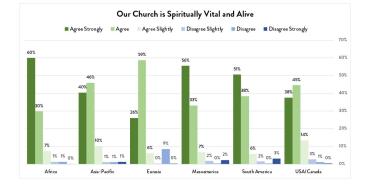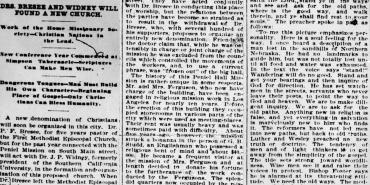Q&A: When the Pastor is Depressed

In each issue, a forum of pastors, laity, theologians, and church leaders respond to your questions on subjects such as doctrine, theology, Christian living, and the church. Send your questions to Holiness Today, Church of the Nazarene Global Ministry Center, 17001 Prairie Star Parkway, Lenexa, KS 66220| E-mail: holinesstoday@nazarene.org. The editor regrets that all questions cannot be printed, acknowledged, or answered.
Q: What should we do when our pastor seems depressed, especially when the pastor may not recognize it? How do we help without putting the pastor on the defense? If our pastor had physical health issues, we would expect that to be handled and would help in any way possible. But mental health issues seem more sensitive.
A: Do pastors ever get depressed? Even Spirit-filled ones? Well, are pastors human? Yes, yes, and yes. Pastors are human, and humans sometimes become depressed. Pastoring people can be emotionally draining, especially in challenging situations. Often, pastors experience "compassionate fatigue" from caring so much about many people.
So how do you respond when you see a pastor discouraged, struggling emotionally, negative in outlook, or lacking energy? Respond as a caring pastor would respond. Let them know you really want to talk with them. Sometimes people make passing comments, almost like throwing an observation at someone. This is not much help!
Be purposeful. Ask for some private time. Initiating time in a non-threatening situation, and with a safe person, helps the pastor to let down their guard.
Agreeing to a specific time and place will help focus upon the purpose. Breakfast or lunch together can set the stage for expressing concern. Concern, not judgment! Telling a person how they should or should not feel does not help.
Or engage together in a hobby, activity, or sport. Spending significant time with each other allows varied opportunities to lay down the burdens of life. (And the physical exercise will also help.)
Invite your pastor over for dinner. Then sensitively and kindly, but purposefully, guide the conversation into real-life topics before you leave the dinner table.
It has been said that a pastor is someone who asks "How are you doing?" and actually waits around to hear your real answer. You can do that with your pastor. Let them know that you genuinely want to hear how they are really doing. Then listen! Actively encourage them to share, and then non-judgmentally listen. Specifically, let them know your commitment to maintain confidentially and respectfully what they share.
You must be a trustworthy person to be trusted with the personal struggles of others. These conversations should not make it onto the prayer request list. Encourage the pastor to seek further help if that seems appropriate.
Ask "How can I help?" You will probably be asked to pray for them. Pray with them by name right then wherever you are. Send them a reminder in a week or two that you are still praying for them. Then call them in a month or two and invite them to breakfast again. Your pastor will find strength and encouragement from your care."
Norm Henry has served the church in many ways, being both psychologist and minister. For several years he worked with Pastoral Ministries and Clergy Development consulting and counseling with Nazarene ministers. Presently, he works with Nazarene Global Missions caring for missionaries.
Please note: All facts, figures, and titles were accurate to the best of our knowledge at the time of original publication but may have since changed.




